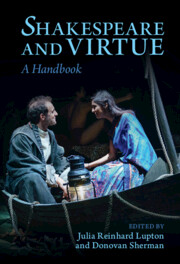Book contents
- Shakespeare and Virtue
- Shakespeare and Virtue
- Copyright page
- Contents
- Contributors
- Acknowledgements
- Introduction
- Part I Shakespeare and Virtue Ethics
- Part II Shakespeare’s Virtues
- Chapter 11 The Four Cardinal Virtues
- Chapter 12 The Three Theological Virtues
- Chapter 13 Prudence
- Chapter 14 Friendship
- Chapter 15 Patience
- Chapter 16 Care
- Chapter 17 Hospitality
- Chapter 18 Respect
- Chapter 19 Chastity
- Chapter 20 Wit
- Chapter 21 Service
- Chapter 22 Humility
- Chapter 23 Kindness
- Chapter 24 Stewardship and Resilience
- Chapter 25 Cognitive Virtue and Global Ecosociability
- Chapter 26 Trust
- Chapter 27 Being “Free” as a Virtue
- Part III Shakespeare and Global Virtue Traditions
- Part IV Virtuous Performances
- Works Cited
- Index
Chapter 13 - Prudence
The Wisdom of “Hazarding All” in The Merchant of Venice
from Part II - Shakespeare’s Virtues
Published online by Cambridge University Press: 19 January 2023
- Shakespeare and Virtue
- Shakespeare and Virtue
- Copyright page
- Contents
- Contributors
- Acknowledgements
- Introduction
- Part I Shakespeare and Virtue Ethics
- Part II Shakespeare’s Virtues
- Chapter 11 The Four Cardinal Virtues
- Chapter 12 The Three Theological Virtues
- Chapter 13 Prudence
- Chapter 14 Friendship
- Chapter 15 Patience
- Chapter 16 Care
- Chapter 17 Hospitality
- Chapter 18 Respect
- Chapter 19 Chastity
- Chapter 20 Wit
- Chapter 21 Service
- Chapter 22 Humility
- Chapter 23 Kindness
- Chapter 24 Stewardship and Resilience
- Chapter 25 Cognitive Virtue and Global Ecosociability
- Chapter 26 Trust
- Chapter 27 Being “Free” as a Virtue
- Part III Shakespeare and Global Virtue Traditions
- Part IV Virtuous Performances
- Works Cited
- Index
Summary
Prudence is the ability to determine the right course of action for a given situation. The virtue is fundamentally concerned with what we should do to achieve a desired objective, rather than what we should believe. Prudence is also a translation of Aristotle’s concept of phronesis (practical reason), which the Nicomachean Ethics defines as an “excellence of deliberation” (VI.9.9). In his formulation, Aristotle emphasizes the rightness of the ends being pursued, unlike several premodern and modern theories focusing only on the ability to attain desired ends, and which develop a somewhat uneasy relationship between prudence and virtue. Shakespeare makes the ethical challenges of prudence integral to The Merchant of Venice, a play featuring many deliberations over the means to such ends as happiness, wealth, friendship, and love. Throughout the play, Shakespeare takes a largely Aristotelian approach to prudence: characters who “hazard all” to gain noble ends are depicted as the most prudent, while the “shrewd,” who deliberate well but for immoral objectives, inevitably fail. Still, Shakespeare adds a final constraint to the virtue, suggesting that prudence is not a static trait but a dynamic effort to uncover one’s blind spots – and thus a virtue that few can hope to master.
Keywords
- Type
- Chapter
- Information
- Shakespeare and VirtueA Handbook, pp. 137 - 144Publisher: Cambridge University PressPrint publication year: 2023

